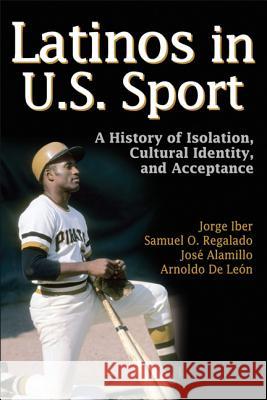Latinos in U.S Sport: A History of Isolation, Cultural Identity, and Acceptance » książka
Latinos in U.S Sport: A History of Isolation, Cultural Identity, and Acceptance
ISBN-13: 9780736087261 / Angielski / Twarda / 2011 / 312 str.
Latinos in U.S Sport: A History of Isolation, Cultural Identity, and Acceptance
ISBN-13: 9780736087261 / Angielski / Twarda / 2011 / 312 str.
(netto: 274,08 VAT: 5%)
Najniższa cena z 30 dni: 275,19 zł
ok. 30 dni roboczych
Bez gwarancji dostawy przed świętami
Darmowa dostawa!
Latinos in U.S. Sport: A History of Isolation, Cultural Identity, and Acceptance is the first comprehensive exploration of Latino culture and its relationship to sport in what is now the United States. Spanning a period of 500 years from the 16th century to the present and discussing a wide range of Latino communities, regions, and sports, Latinos in U.S. Sport offers an accessible examination of the Latino sporting experience in the United States by covering topics ranging from cultural issues to economics. Using newspaper accounts and primary sources as well as dissertations and scholarly articles from history, education, sport business, and other disciplines, the authors provide a thorough and enlightening account of this population's role in U.S. sport history. The text details the experiences of Mexican Americans, Puerto Ricans, Cubans, Dominicans, and others as it chronicles the community, school-based, and professional influences of Latinos within a variety of sports and sport contexts. The authors discuss the evolution of sport, games, and physical activity. They also examine the shifting perceptions both within and outside of the Latino community and the outcomes of these changes. The timeline within the text gives readers a visual presentation of the key events and figures in this culture's history. The book highlights Latino athletes and teams who overcame great odds to succeed at the local, high school, collegiate, and professional levels and details the early participation of such individuals in international athletic competitions, such as the Olympics and Pan-American Games. In addition to examining well-known figures such as Nancy Lopez, Chi Chi Rodriguez, Pancho Gonzalez, and Roberto Clemente, special Unknown Heroes sidebars introduce readers to many lesser-known but influential athletes and coaches. Latinos in U.S. Sport begins by detailing the games and diversions particular to the Spanish conquistadors, various Native American groups, and the integrated culture of the mestizo, and it traces the ways in which American influence moved into these regions. Moving ahead to the late 19th and early 20th centuries, the text describes how European Americans used baseball as part of their attempt to bring "civilization" to the areas of the Caribbean and the Southwest. The text also discusses how the success of Cubans and other Latin Americans within Major League and Negro League Baseball helped to challenge the perception of Spanish speakers among the broader U.S. population. The final section of the book discusses the increasing presence of Latinos in all fields of sport competition, their growing presence in management and ownership of sport franchises, and their increasing economic power as consumers of athletic events.Latinos in U.S. Sport presents a long-overdue look at the history of Latino participation in multiple facets of American sport and provides a balanced and more complete history of the contribution of Spanish-speaking people to the history of U.S. sport. The text aims to generate discussion and inspire further recognition of the influence of Latinos in the U.S. sport world.











